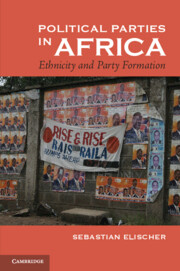Book contents
- Frontmatter
- Dedication
- Contents
- Tables
- Abstract
- Acknowledgments
- 1 Comparative Politics and Political Parties in Africa
- 2 A New Framework of Comparison for Political Parties
- 3 Kenya: The Ubiquity of Ethnic Parties
- 4 Namibia: The Dominance of Nonethnic Parties
- 5 Ghana: The Ubiquity of Nonethnic Parties
- 6 The Diversity of African Party Politics
- 7 Explaining the Formation of Nonethnic Parties
- Conclusion
- Annex A Operationalization of Secondary Party Types
- Annex B The Standard MRG Coding Frame
- Annex C Number of Effective Programmatic Categories
- Annex D Summary of Party Nationalization Scores (PNS) and Party Divergence Scores (PDS)
- Annex E Result for MRG Coding Scheme
- Annex F PNS Calculated on the Basis of Afrobarometer Data
- Annex G Scope of Party Systems Covered
- Annex H Party Nationalization Scores (PNS) of the Preliminary Cases
- Bibliography
- Index
Conclusion
Political Parties in Africa
Published online by Cambridge University Press: 05 June 2014
- Frontmatter
- Dedication
- Contents
- Tables
- Abstract
- Acknowledgments
- 1 Comparative Politics and Political Parties in Africa
- 2 A New Framework of Comparison for Political Parties
- 3 Kenya: The Ubiquity of Ethnic Parties
- 4 Namibia: The Dominance of Nonethnic Parties
- 5 Ghana: The Ubiquity of Nonethnic Parties
- 6 The Diversity of African Party Politics
- 7 Explaining the Formation of Nonethnic Parties
- Conclusion
- Annex A Operationalization of Secondary Party Types
- Annex B The Standard MRG Coding Frame
- Annex C Number of Effective Programmatic Categories
- Annex D Summary of Party Nationalization Scores (PNS) and Party Divergence Scores (PDS)
- Annex E Result for MRG Coding Scheme
- Annex F PNS Calculated on the Basis of Afrobarometer Data
- Annex G Scope of Party Systems Covered
- Annex H Party Nationalization Scores (PNS) of the Preliminary Cases
- Bibliography
- Index
Summary
THE EMERGENCE OF NONETHNIC POLITICS
African independence did not produce viable democratic states. From the early to mid-1960s, African nations underwent a rapid transformation to various forms of autocratic rule. Then, against the economic odds, multiparty democracy made a stunning and unpredicted comeback. Since the early 1990s, multiparty democracy has become the norm in many African countries. Nevertheless, there has been little conceptual and no comparative work on African parties or, indeed, parties in nonindustrialized democracies. Due to the silence on African parties, the scholarly community has missed the entry point to research how nonindustrialized countries democratize. The neglect of the study of individual African parties served as the point of departure for this study. The findings of this book shatter dominant assumptions about party politics in ethnically segmented societies. Ethnic parties are neither inevitable nor ubiquitous. The African landscape is more diverse than conventionally assumed.
After a concise review of the major argument, the present chapter elaborates on the democratization potential of African parties. Parties are the inevitable byproduct of democratization, yet the reverse relationship is rarely, if ever, analyzed. Only a few works exist. All highlight the deficiencies of African parties amid democratic consolidation. These studies frame their evaluations in terms of the European mass party of the 1960s. The European mass party, however, has outlived itself both in Europe and elsewhere. Comparative politics scholars have failed to propose alternative normative criteria by which the democratization potential of parties can be evaluated. Due to the lack of alternative criteria, I deliberately highlight the positive effects of African parties on democratization. A systematic analysis of parties is labor-intensive, and accordingly, the scope of this study is confined to a few cases. Accordingly, the findings of this book call for more comparisons between African parties, but also for future comparisons with parties elsewhere. Scholars interested in other regions of the globe can take the operationalization of the Diamond and Gunther (2001) typology as a starting point for the comparisons of parties in their region of interest.
- Type
- Chapter
- Information
- Political Parties in AfricaEthnicity and Party Formation, pp. 261 - 274Publisher: Cambridge University PressPrint publication year: 2013

